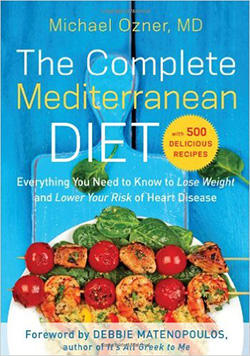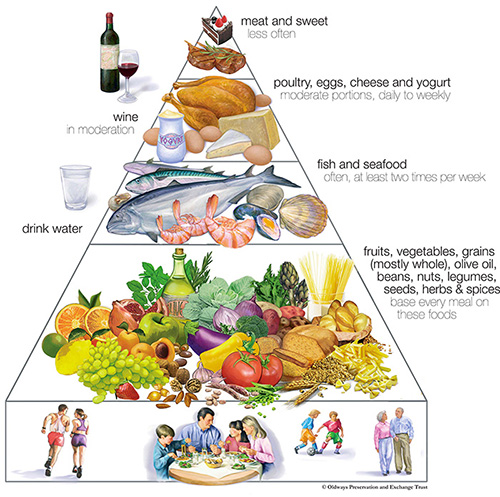You can't go far without hearing something new about the Mediterranean diet. Every week, it seems, there is new research supporting the Med diet for anti-aging, heart health, weight loss, treating depression, preventing diabetes, fighting inflammation and even an improved sex life. Contrary to other diets, however, there is no formal, agreed-upon definition of the Mediterranean diet—but there are some common themes: an emphasis on olive oil, vegetables, fruits, nuts and seeds, beans and legumes, selective dairy intake, and whole grains; often fish and other seafood; and quite limited consumption of meat. Moderate wine intake is often explicitly included as well. I've stated before that I don't follow any specific diet, but if I were to add a label to the way I habitually eat, it would look close to the Mediterranean diet themes listed above.
 The cookbook: The Complete Mediterranean Diet: Everything You Need to Know to Lose Weight and Lower Your Risk of Heart Disease
The cookbook: The Complete Mediterranean Diet: Everything You Need to Know to Lose Weight and Lower Your Risk of Heart Disease
The author: Dr. Michael Ozner is a board-certified cardiologist and one of America's leading advocates for heart disease prevention. He is a well-known national speaker in the field of preventive cardiology, frequently appearing in print, radio and television, including The New York Times, NPR radio and CBS News. Dr. Ozner is also the Symposium Director for Cardiovascular Disease Prevention, an annual international meeting highlighting advances in preventive cardiology and dedicated to treatment and prevention of heart attacks and strokes.
This guy knows a lot about heart health and has a concise, no-nonsense approach to heart disease prevention. He has also authored Heart Attack Proof and The Great American Heart Hoax. Dr. Ozner preaches the importance of preventive cardiology and advises patients, when able, away from heart surgery and toward a noninvasive approach that focuses on lifestyle changes, such as diet, exercise, stress reduction and the judicious use of medications.
Initial impressions: In full disclosure and unlike many of the other books I review here, this book contains no meticulously-styled, beautifully-photographed images of food. In fact, it's just black ink on white paper, a lot like your high school textbooks, but with fewer diagrams. Similar to Dr. Ozner's approach to heart disease prevention, his book is filled with no-frills, straight-forward facts over fiction. But you know what? I love that. In a world (especially my health/publishing world) where fad diets pop up today and fizzle out tomorrow and where attention spans for nutritional know-how last about as long as an Instagram feed, it's refreshing to dig into a book that just makes so much sense.
And you know what else? It's not boring. Dr. Ozner opens the book with anecdotal stories about heart attack victims—people like you or me who have fallen into unhealthful habits that trigger a disease that they never saw coming. Unfortunately, Ozner explains, for the majority of men and women, the first symptom of heart disease is when you experience a heart attack—or sudden death. And by then, it's too late. The only way to defeat this formidable enemy, cardiovascular disease, is to attack when the enemy is most easily defeated—prior to the onset of symptoms!
The book continues with an explanation of the history of the Mediterranean diet, including the scientific studies that back up the diet's ingredient spotlights, including the "why"s in support of whole grains, produce, nuts, beans, fish, olive oil and red wine. But beyond the food components of the Med diet are important observations about the way that people in Mediterranean countries tend to live: They walk to work, they don't work while they're eating, they exercise often and they find natural ways to deal with stress (see Delicious Living's 15 Natural Ways to Relax for starters). Ozner goes on to explain how to put the pieces of the diet together—such as how to identify the best sources of fats and healthful carbohydrates—as well as how to drink alcohol in moderation, foods to avoid and foods to emphasize. The informative front section of the book ends with the reader feeling completely inspired and ready to embrace a way of eating that focuses on whole foods and a more balanced lifestyle … and who couldn't use that?

What’s cool: In addition to the 500 (yes, 500!) recipes in this bible of a cookbook, the recipes section open with a 14-day menu plan designed to be an easy, step-by-step intro into eating the Mediterranean way. Each day consists of a plentiful breakfast, optional midmorning snack (usually nuts and water). a produce-packed lunch, optional midday snack, a filling dinner (many refer to recipes within the book) and an optional evening snack. It's clear that this diet is not about deprivation, and all about choosing the right foods in healthful portions. The entire rest of the book is filled with recipes ranging from salads and soups to pizza, frittatas, sandwiches and breads. There are also recipes for fish, pasta, side dishes and desserts. Most recipes call for olive oil and a variety of fresh vegetables. A few must-try standouts for me were Tuscan Braised Fennel; Polenta with Mushrooms and Garlic; Homemade Focaccia; and Pan-Seared Parmesan Cheese Scallops with Rice Pilaf.
Another nice feature of the book is Dr. Ozner's appendix on how to eat with Mediterranean intentions when dining out at a restaurant, such as opting for grilled, baked or boiled dishes instead of fried, and ordering a side salad with an oil-vinegar dressing. Dip your toe into easy Mediterranean cuisine by trying our suggestions for a Mediterranean breakfast, lunch and dinner.
Perfect for: someone with a family history of heart health issues, diabetes or weight struggles; families desiring whole-food recipes; healthy eaters; people who embrace preventive, holistic approaches to health
When/Where to get it: The Complete Mediterranean Diet was printed in 2014 and is available now on Amazon for $15.
Sneak-peek recipe: Don't shy away from flavor-packed, heart-healthy sardines. Try them in this simple recipe for Sardines Pasta with Lemon and Garlic (reprinted with permission from the publisher, BenBella Books, Inc.)
